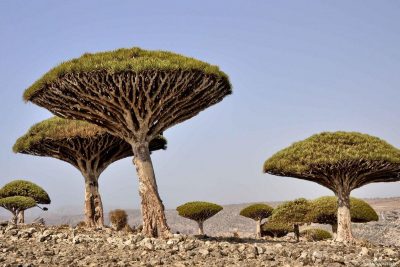UAE Steals Endangered Trees from Yemen’s Socotra

Images and videos circulating on social media show endangered Dragon’s Blood (Dracaena cinnabari) trees, native only to Yemen’s Socotra island, being displayed in Abu Dhabi, UAE.
Known locally as “Dum Al-Akhawain” or “blood of the two brothers”, the trees are considered one of the most important features of the island of Socotra archipelago.
This confirms previous reports that the UAE, who locals perceive as an occupying force, may have been stealing the UNESCO protected tree. There have also been reports from last year of coral reef stones and rare birds being looted from the island. Emirati forces began to arrive on the island in April 2018 without prior coordination with the Yemeni government.
Image on the right: Dragon’s Blood (Dracaena cinnabari) trees, native only to Yemen’s Socotra island, being displayed in Dubai, UAE.

The iconic trees are known for their red sap, locally known as “emzoloh”, which has a wide range of medicinal uses. Referred by the ancients as “cinnabar” it has been traded since before 60 AD.
One widely circulated video shows an Emirati man showing off one such tree at the entrance of his house for decoration. He can be heard confirming that it is from Socotra.
Other images show that the trees have been planted in public spaces in Dubai.
According to the website Uprising Today, many Yemenis are under the impression that the “UAE’s inferiority complex of not having any history and civilisation of its own, drives it to steal what it can from Yemen’s ancient civilisation.”
Local news source the Socotra Post has said the Socotra residents fear the UAE intends to carry out a coup against the Yemeni authorities, one such attempt was reported earlier this month. It has been said that the foreign soldiers and officials have been treating the island as if it belongs to the UAE rather than to Yemen, even raising Emirati flags over government buildings.
*
Note to readers: please click the share buttons above or below. Forward this article to your email lists. Crosspost on your blog site, internet forums. etc.
Featured image: The Yemeni island of Socotra on 12 February 2014 [Rod Waddington/Flickr]

